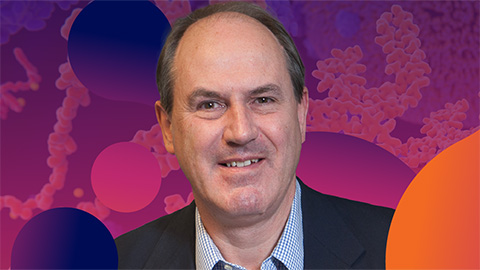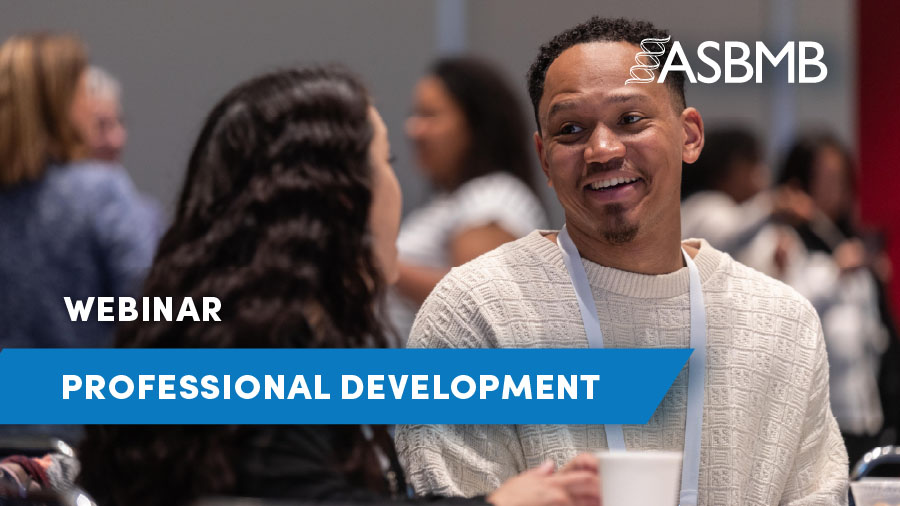Society news briefs: February 2022

Advocating for the well-being of students in STEM
The American Society for Biochemistry and Molecular Biology public affairs team has endorsed the Higher Education Mental Health Act of 2021 and continues to work with policymakers on Capitol Hill to gather support for it. If passed, this bill would establish a commission to study the mental health concerns of students and create a roadmap for universities to improve mental health services. Read more about ASBMB's endorsement.

Unconscious bias webinar: Feb. 17
The ASBMB Women in Biochemistry and Molecular Biology Committee and Minority Affairs Committee will host a webinar on unconscious bias from 2:30 p.m. to 4 p.m. Eastern on Feb. 17. It will be led by Darin Latimore, deputy dean and chief diversity officer at the Yale School of Medicine. Register.
New public affairs director

Benjamin Corb, who led the society’s public affairs office for more than 12 years, took a new job in January at the consultancy Edelman. Sarina Neote, formerly the ASBMB’s science policy manager, is the new director. Neote started her career in the field of international relations by focusing on global health issues. Soon, public–private partnerships and the research-and-development pipeline piqued her interest. She fell down that rabbit hole and decided to earn a master’s degree in biomedical science policy. Since then, she has professionally advocated for sound regulatory policy and studied health outcomes and the role of the private sector in global health. Read Neote's reporting for ASBMB Today.
ASBMB joins the Future of Scholarly Meetings project
The ASBMB is one of 16 societies participating in a study funded by the Alfred P. Sloan Foundation on the pandemic’s effects on scholarly conferences and the future of meetings. The ASBMB, like other organizations serving various industries, has had to be flexible and creative, pivoting quickly to virtual offerings that extend our reach and that are accessible to a large number of researchers. However, in-person meetings offer spontaneous interactions and more prospects for finding collaborations. We look forward to sharing ideas with the cohort of participating societies. Key findings from this project will be published in late 2022. Learn more about the Future of Scholarly Meeting project.
Haltiwanger and Martemyanov join JBC

Robert Haltiwanger and Kirill Martemyanov became associate editors for the Journal of Biological Chemistry in January. Haltiwanger, a professor specializing in glycobiology at the University of Georgia, is a past member of the ASBMB Publications Committee. His lab is particularly interested in O-linked glycosylation. Martemyanov, chair of the neuroscience department at Scripps Research in Florida, is an authority on G protein–coupled receptors. His lab is focused on the nervous system and transsynaptic and neuronal wiring.
Deadline for Student Chapter Outreach Grant applications: March 1
Time to apply: ASBMB Student Chapter Outreach Grants support chapters doing outreach activities in their communities. Chapters are encouraged to begin planning outreach initiatives for the fall 2022 semester by applying for this grant, worth up to $500. Applications are due March 1. Visit asbmb.org/education/student-chapters/awards/outreach-grant.
Congratulations: Our hats are off to the chapters at Fairleigh Dickinson University, Stephen F. Austin State University, University of California, Santa Barbara and the University of Massachusetts Amherst, which won funding during the most recent application cycle. We look forward to following and supporting their outreach efforts this spring.
Deadline for summer research funding for Student Chapter members: March 1
Student Chapter members may apply for the Undergraduate Research Award, which grants $1,000 to support the awardees’ summer research projects. The deadline for this year’s award is March 1. Applicants must submit a research statement that includes details of the methods used for data collection and a clear summary of the proposed project.
ASBMB receives funding for DEI training

The ASBMB is scaling up its efforts in support of diversity, equity and inclusion in the fields of biochemistry and molecular biology thanks, in part, to a $2,000 grant from the Amplifying the Alliance to Catalyze Change for Equity in STEM Success (ACCESS+) Initiative, of which the society is a part. The grant will be used to train staff and committee members.

Women’s History Month Twitter chat: March 8
The ASBMB Women in Biochemistry and Molecular Biology Committee is hosting a Twitter chat on March 8 in observance of Women’s History Month and International Women’s Day. Panelists will discuss navigating the BMB fields and science as a whole as women in science. Join the conversation by following @ASBMB and searching the hashtag #WomeninBMB.
Deadline for Sewer diversity scholarship applications: June 1
The ASBMB supports the advancement of diversity, equity and inclusion in science by offering the Marion B. Sewer undergraduate scholarship to students who show demonstrated interest in the fields of biochemistry and molecular biology, as well as enhance diversity in science. This award provides $2,000 of financial support toward undergraduate tuition costs for one academic year. Applications will be accepted until June 1.
Enjoy reading ASBMB Today?
Become a member to receive the print edition four times a year and the digital edition monthly.
Learn moreFeatured jobs
from the ASBMB career center
Get the latest from ASBMB Today
Enter your email address, and we’ll send you a weekly email with recent articles, interviews and more.
Latest in Careers
Careers highlights or most popular articles

From humble beginnings to unlocking lysosomal secrets
Monther Abu–Remaileh will receive the ASBMB’s 2026 Walter A. Shaw Young Investigator Award in Lipid Research at the ASBMB Annual Meeting, March 7-10 in Washington, D.C.

Chemistry meets biology to thwart parasites
Margaret Phillips will receive the Alice and C. C. Wang Award in Molecular Parasitology at the ASBMB Annual Meeting, March 7-10 in Washington, D.C.

Decoding how bacteria flip host’s molecular switches
Kim Orth will receive the Earl and Thressa Stadtman Distinguished Scientists Award at the ASBMB Annual Meeting, March 7–10, just outside of Washington, D.C.

Defining JNKs: Targets for drug discovery
Roger Davis will receive the Bert and Natalie Vallee Award in Biomedical Science at the ASBMB Annual Meeting, March 7–10, just outside of Washington, D.C.

Upcoming opportunities
No matter where you are in your career and what future path you aspire to, everyone needs leadership skills. Join ASBMB for practical strategies for building and practicing leadership skills.

Close out ASBMB 2026 with a bang
The closing reception of the 2026 ASBMB Annual Meeting will be held at the Torpedo Factory Art Center in Alexandra, Virginia.
